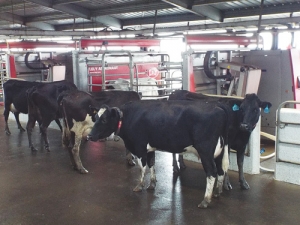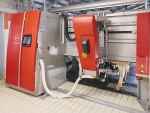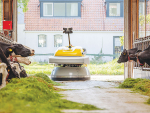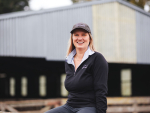Large numbers turned out to a recent 'show and tell' at a Lely robotic-milking farm near Morrinsville, owned by the Cameron family.
The Camerons milk 480 Friesian and cross-bred cows on 170ha effective, and after buying adjacent land they took the plunge and built a shed to house six Lely A4 robots and a dairy.
The property had been farmed by successive generations since the early 1900s and Ben Cameron says "the driving force for us was to make plans for the future right now, and get ourselves in a position where our children would hopefully want to take over one day, and explore the same sort of opportunities we were given".
Robotic milking has brought notable benefits, not least a reduction in labour.
Manager Darren Smith oversees the operation with only one assistant and lists three standout features.
"Firstly, the cows are happy and quiet, milking well and showing good condition. Secondly, the system allows us more flexibility in the hours we work; we don't do any less, but we can get more done onfarm without worrying about getting back to the shed to get ready for milking. Thirdly, we have a raft of information at our fingertips such as yield, body weight and cell counts to help us make informed management decisions."
Other benefits: individual quarters are milked separately with suction stopping as milked flow ceases, and blind milking is eliminated, lowering the incidence of mastitis.
Smith says the move to robotics was largely trouble free; cow 'training' was minimal, most cows getting used to the system in three-four milkings and a few timid ones within a week.
The system is incentive-based: cows are fed a ration during milking then get access to fresh pasture; it's all much calmer than when cows were pushed into the milking shed.
Nowadays Smith treats the farm as three units with three races; he structures the grazing regime so animals have access to fresh paddocks after each milking.
The cows are free to milk themselves as many times as required within the range 1.7-2.5 milkings per day.
Some cows are seen to prefer robots and wait until these are vacant, some prefer left- or right-hand stalls, and the records show that one cow has only ever been milked by robot number 6.
Samuel Anderson, general manager dairy at Lely NZ, says robotic milking "has come of age, with wide acceptance by farmers who realise you can't manage what you can't measure".
"Robots mean cows are herd tested every day; and the inclusion of cell count measurement, microphones listening for rumination and activity sensors recording movement give operators early warning of potential problems, or even heat detection, which drafts cows automatically for further inspection."
Anderson says farmers' rising acceptance of robotics is contributing to unit costs falling. He says robotic set-ups are becoming cost-comparable with new rotary set-ups but are smaller, produce more milk, slash labour costs and give farmers more time for better husbandry.
www.lely.com


















